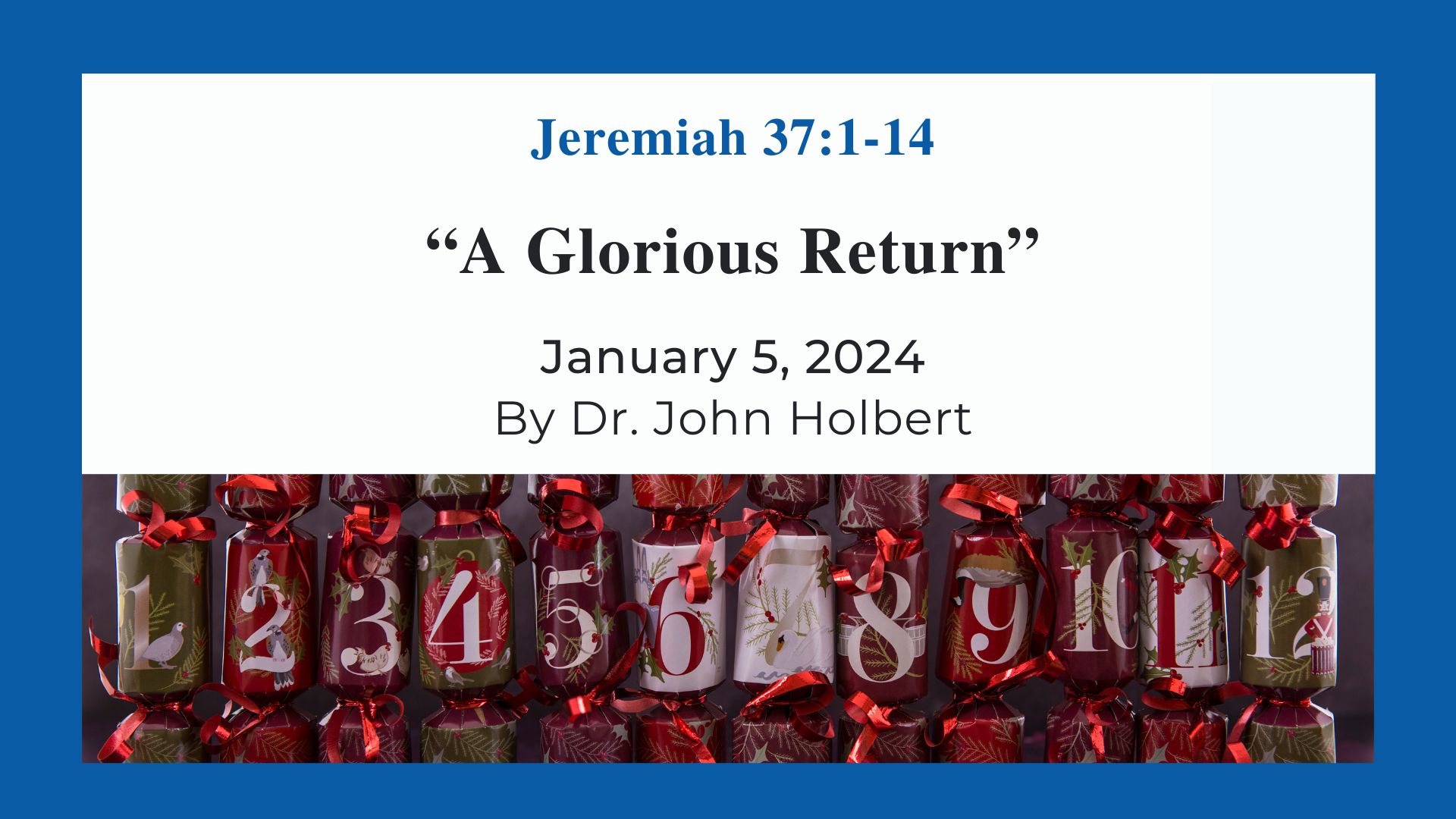A Glorious Return - Reflections on Jeremiah 31:7-14, Christmas 2, Year C
by John Holbert on Tuesday, December 3, 2024

The book of Jeremiah is exceedingly complex in its composition. It purports to offer a kind of prophetic biography, covering the very long life of Jeremiah, from his birth in the priestly city of Anathoth during the reign of the reforming king, Josiah (640-609BCE), until his apparent death in Egypt sometime after the destruction of Jerusalem in 587BCE. Thus, his ministry of the word of YHWH, begun we are told in the 13th year of Josiah’s rule (hence, 627BCE, if the historical note of Jer.1:2 is accurate) and ending in the aftermath of the Babylonian assault on the holy city, was a prophetic work of no fewer than 40 years. His historical context proceeded from the excitement of Josiah’s promise of a new day, instigated by the discovery of a scroll in the excavation and rebuilding of the Jerusalem Temple in 622BCE, to the devastation of that same temple 35 years later. Jeremiah performed his work during the most consequential decades of Israel’s history.
Much of his early prophecy focuses on Judean malfeasance, their refusal to pay attention to the marginalized of their community (Jer.5 is one example of many), their reliance on a false sense of the safety of the temple (Jer.7) in the face of their corrupted practices in society, and their raw idolatry, rejecting YHWH outright in exchange for a panoply of idols (Jer.2:20-25). Later, as the dangers of a resurgent Babylon began to be inevitable, he turned to commentary about the coming defeat and exile, urging the Judeans to accept their destruction as a sign of YHWH’s disfavor, and bidding them to pray for the security of the city of Babylon where they were destined to live for at least two generations. This promise was uttered despite other so-called prophets who claimed the exile would be brief and not difficult (so, Jer.28 and the prophetic battle between Jeremiah and Hananiah). History makes it clear that Jeremiah was all too right about his notion of Judean exile; it was nearly 50 years in length, so long that many Judeans were born in Babylon, and many of them adopted Babylonian ways.
But not all Judeans became Babylonian. Some maintained Judean beliefs and practices, but since the anchors of those beliefs—the land, the king, the priests, the temple—were all gone, the exiled Judeans had to adapt their faith to a new and quite different context. Though some longed for a speedy return to the beloved Jerusalem, lamenting their loss, and crying for the “good old days” (Ps.137), many began to think anew about the faith that had nurtured them, seeking to make it fresh and powerful in their now Babylonian homeland. As a result, a significant Jewish community flourished there for the next 1000 years, producing significant literature that would serve exiled Jews the world over.
However, the idea of a return to Jerusalem remained strong and vibrant throughout the years of exile, an idea still current as Jewish rituals end even today with the hope “next year in Jerusalem”. And those ideas found their way into the book of Jeremiah in those lively verses that constitute glorious paeans to YHWH who never forgets the chosen ones and promises that they will again see their holy land and city. Jer.31:7-14 is one of those poems that depicts the joy and gladness that will resound among the returnees, the “remnant of Israel,” as the poem names them (Jer.31:7). The collectors of the lectionary often turn to passages like this one to portray in poetry the feelings that the birth of Jesus Messiah can evoke in those who would follow him in his ministry. The implication is that like those ancient exiles, we can return to our Messiah from our own exiles apart from him and his call on our lives.
How we can feel when we “return” to Jesus, the Messiah, may be found at the end of this lovely text. “Then the young women will rejoice in a dance, along with old and young men. I, YHWH, will change their sorrow to joy; comfort I will give in place of sadness. I will offer the lives of priests a richness, while my people shall be sated with my goodness” (Jer.31:13-14)! The exilic return shall be marked with music, dancing, unbounded joy, happy and satisfied priests, and a people literally wallowing in the full goodness of their God. Thus it will be for the ultimate return of Israelite exiles to their beloved land, and so it will be when we who would follow the babe at Bethlehem find our way to him. This is a marvelous text with which to celebrate our own coming home to the one who calls us to his service.
